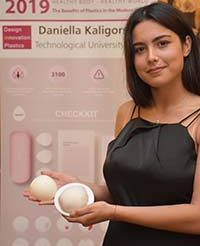Breast cancer kit earns student top prize at Design Innovation in Plastics competition

 |
| Daniella Kaligorsky, a student at the Technological University Dublin, won the 2019 Design Innovation in Plastics competition for her kit that shows how to conduct a self examination for breast cancer. |
A student at the Technological University Dublin has won the 2019 Design Innovation in Plastics (DIP) competition for CHEKKIT, a kit that shows how to conduct a self examination for breast cancer.
Third-year student Daniella Kaligorsky developed the kit, which includes models that simulate the breast and the physical symptoms of breast cancer. It includes a brochure that explains what to do and how to recognize 12 possible symptoms, along with a notebook to log results.
Competition organizers, the Institute of Materials, Minerals and Mining and the Worshipful Company of Horners, set this year’s theme of “Healthy body – healthy world,” inviting ideas for improving health, well-being or encouraging exercise, with a product that could demonstrate longevity and sustainability. DIP was established in 1985 and is the longest-running student plastics design award in Europe.
Commenting on the winner, the chairman of the judging panel Richard Brown said the judges were extremely impressed with Daniella’s thorough research into the medical and practical need; her comprehensive review of materials to get the right texture and touch for her product; along with her analysis of manufacturing methods, costs, end user experience and sustainability. She had also given due consideration to competitor products. “We felt very strongly that this was a product that would enhance well-being and was market-ready to meet Daniella’s vision for it,” said Brown.
Kaligorsky used silicone 10 shore and ABS to fabricate the breast model. The chosen silicone properties were selected due to flexibility and the material’s capability to replicate skin texture. The ABS was chosen for its stiffness and served to replicate a tumor and to construct the back plate.
Another member of the panel, technical engineer Mike Stuart, formerly of Covestro, which sponsored the competition, said the well thought through manufacturing and practical presentation would help de-stigmatize the subject of breast examination and make it useable even in schools. “This product could be put into production fairly quickly, and we feel a possible future application could be a similar kit for testicular cancer,” he explained.
Losing a member of her family to breast cancer inspired Kaligorsky to look deeper into this subject and try to address the problem. “It is a great opportunity to be able to pursue product design and be recognized and acknowledged by such a great competition and I am proud that the significance of the problem with cancer is recognized,” she said.
“I’ve learned a substantial amount about plastics and the manufacturing process. There is still so much to learn, and I am excited to take a step further to discover more about the world of plastics and the benefits that it can provide.”
Kaligorsky was named the winner of the competition at a ceremony in London on July 5. She will receive a cash prize, an internship at one of the design bureaux that sponsored the competition (Brightworks, Innovate Product Design, PDD and RJG Technologies) and a trip to Germany to tour the heaquarters of Covestro.
The four other finalists are:
Kai Wang, a student in integrated product design in his fourth year at Brunel University. His Potluck product is described as a “clever combined cooking and storage device that encourages and simplifies the production of stock cubes using food waste.” HTV silicone rubber was used for the main body of the product, handles and lid. Base plates and the support ring were made from 316L stainless steel to optimize product durability and lifespan.
Christopher Kay, a fourth year product design student from De Montfort University, came in third with EnviroJect, a re-usable syringe system, providing a safe and sustainable method of administering medications. A combination of PP, ABS, COC film and rubber was used in its fabrication
Louis Farnsworth, a third year product design student from De Montfort University, was highly commended for Air, a smart breathing aid for asthmatics to reduce asthma flare up and irritation to the lungs and airway when exercising. A combination of polypropylene, silicone (Shore AA 40 and Shore 00 10) and metalized ABS was used.
Namgyun Ryu, a first year MSc Integrated Product Design student from Brunel University, also received a high commendation for the Tri Walker, a walking aid for the elderly providing enhanced mobility and improved functionality over conventional walking aids. Polycarbonate was used in its fabrication.
